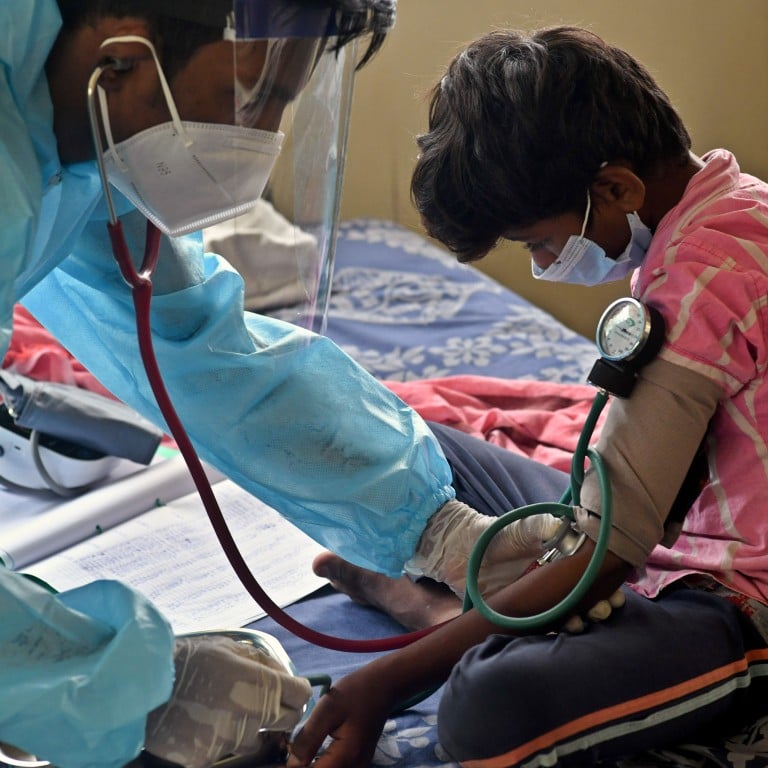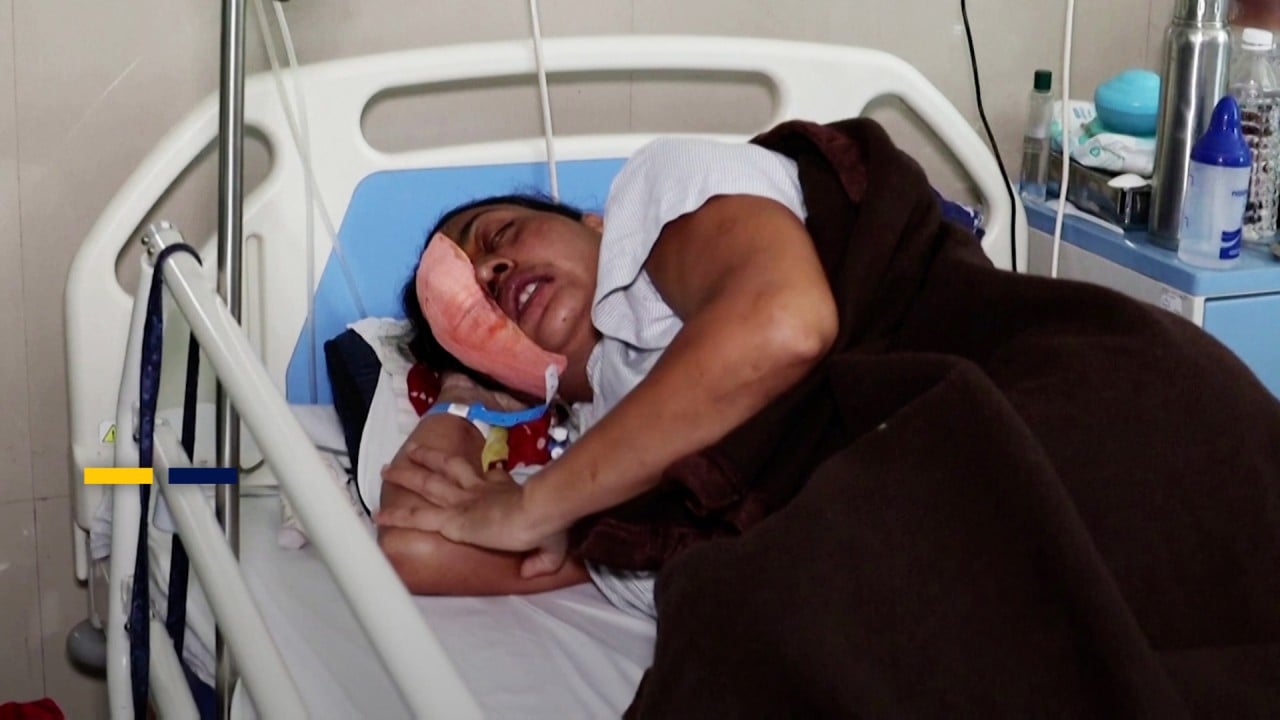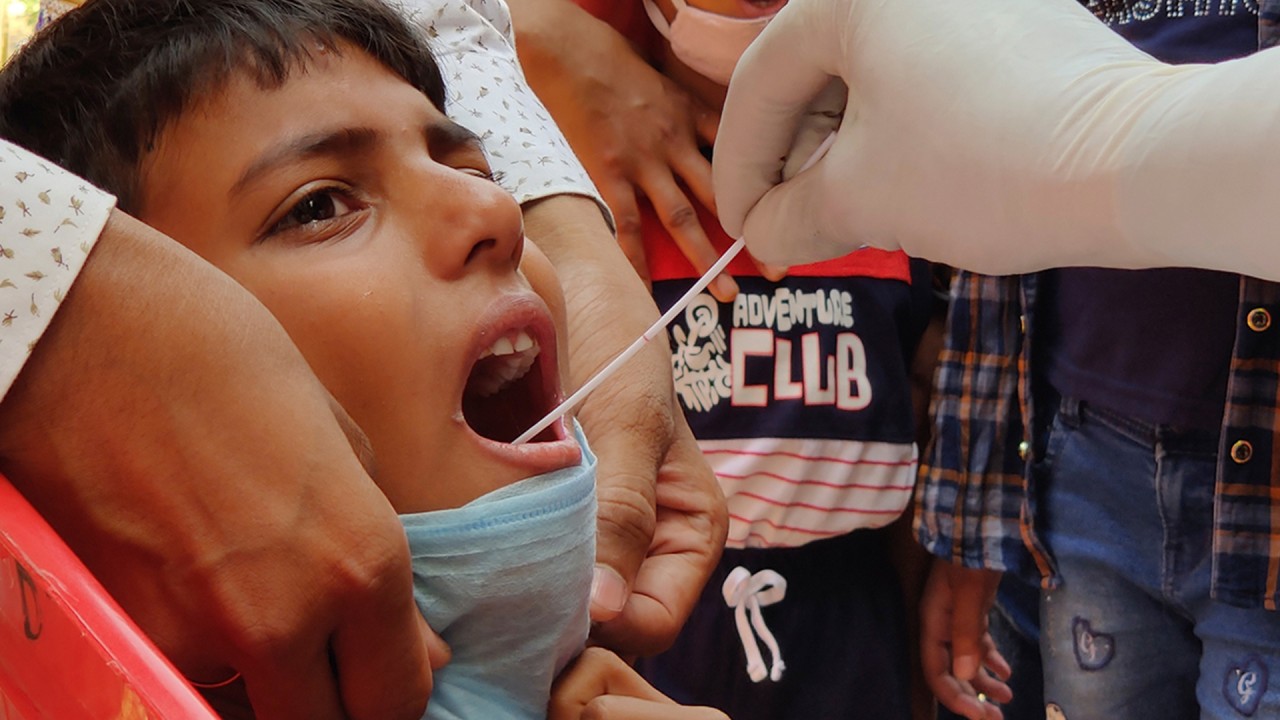
Hearing loss, organ failure, fungus, gangrene: as India’s coronavirus hell eases, new threats emerge
- Symptoms and complications not typically seen in Covid-19 patients have been linked by doctors in India to the so-called delta variant
- In an alarming development, it also appears to be infecting more children – and causing a rare inflammatory syndrome that attacks their vital organs
Hearing impairment, severe gastric upsets and blood clots leading to gangrene – symptoms not typically seen in Covid-19 patients – have been linked by doctors in India to the so-called delta variant that drove the country’s second wave.
One man in Ghaziabad reportedly recovered from Covid-19 only to die in hospital of septicaemia last month after contracting all three fungal infections.
Without immediate treatment, any fungal infection can be fatal – especially in patients with suppressed immune systems. Worse, India is suffering an acute shortage of the antifungal medications needed for treatment.

01:46
The black fungus nightmare facing India’s coronavirus patients
Other complications being reported among those who have recovered from Covid-19 include stomach pain, nausea, vomiting, loss of appetite, hearing loss and joint pain. Organ failure is another rare but serious complication, as is multisystem inflammatory syndrome in children, or MIS-C.
“In the earlier wave too, we saw some complications but they were not serious, mainly fatigue,” said Dr Deepak Shah, a cardiologist at KEM Hospital in Pune. “This time patients are coming back with far more serious complications.”
Some patients develop micro thrombi, or small blood clots, so severe that they have caused affected tissue to die and develop gangrene, said Ganesh Manudhane, a Mumbai cardiologist, who has treated eight patients for thrombotic complications at the Seven Hills Hospital during the past two months. Two required amputations of fingers or a foot.
“I saw three-to-four cases the whole of last year, and now it’s one patient a week,” Manudhane said.
Indian children battle grief and guilt as Covid-19 claims parents
India’s recent surge in cases – the country has reported more than 18.6 million infections this year compared with 10.3 million in 2020 – may have driven an increase in the frequency with which rare complications are being observed. Even still, Manudhane said he is baffled by the blood clots he has been seeing in patients across age groups with no history of coagulation-related problems. “We suspect it could be because of the new virus variant,” he said.
In an alarming development, it also appears to be infecting more children. More children have contracted Covid-19 in India’s second wave than in its first, and though most infections among younger people are mild, complications are still commonplace.
Only vaccination can save our children.
Dr Dhruva Chaudhry, head of the University of Health Sciences’ department of pulmonary and critical care medicine in Rohtak, said parents often mistake the symptoms of MIS-C, in particular, for “any of the tropical diseases that are common in India during the summer months – viral fever, malaria, typhoid or dengue”.
“That causes a delay. Parents have to act fast and take them to a doctor who can diagnose MIS-C quickly,” he said.
More than 2,000 cases of MIS-C have been recorded across India since the start of the pandemic. Over 200 of these have been in New Delhi, where the private Sir Ganga Ram Hospital has set up a dedicated unit to constantly monitor the inflamed vital organs of children who have the syndrome.
“Most children recover but the quality of life they have depends on how badly the organs were affected,” said Dr Harish Pemde, director of paediatrics at Lady Hardinge Medical College in the Indian capital.
‘Death all around’: bereaved Indians search for solace amid Covid-19
Dr Arun Shah, a paediatrician in Muzaffarpur, said the concern now was that an expected third wave of infection could be driven by a new, more devastating variant than those currently in circulation – with proportionally more children affected.
“Most will get mild Covid, as children do all over the world,” he said. “But what is alarming is the size of the increase in absolute numbers. More children with Covid means more children with MIS-C.”
Even as India’s outbreak begins to ease – daily infections have slipped to about a quarter of the May 7 peak when more than 400,000 cases were being reported every day – the rise of associated complications has bolstered calls for mass vaccinations.

06:05
‘Silent emergency’: children in India facing Covid-19 crisis, says Unicef
In Ahmedabad, some 70 per cent of intensive-care beds are currently occupied by people who recovered from Covid-19 only to return to hospital suffering from a related ailment, according to The Times of India.
“Only vaccination can save our children,” said Dr Shah. “Meanwhile the government must ramp up facilities for children with MIS-C because it is not something that can be treated at home. It has to be in hospital with specialised treatment and very expensive medication.”
Hospitals across India are now preparing for the third wave of contagion to hit, as lockdown-like restrictions are eased nationwide. According to the Indian Academy of Paediatrics, children are unlikely to be too badly affected – though as with most assertions made amid the pandemic, only time will tell.
Additional reporting by Bloomberg

